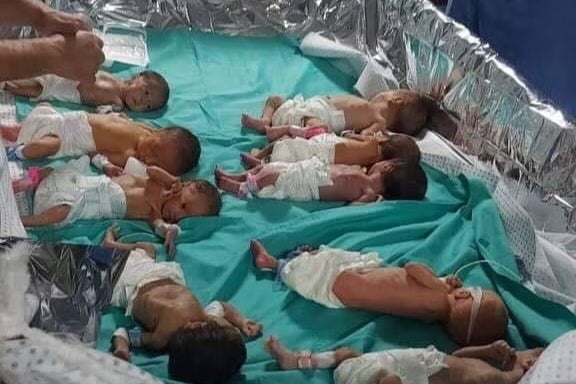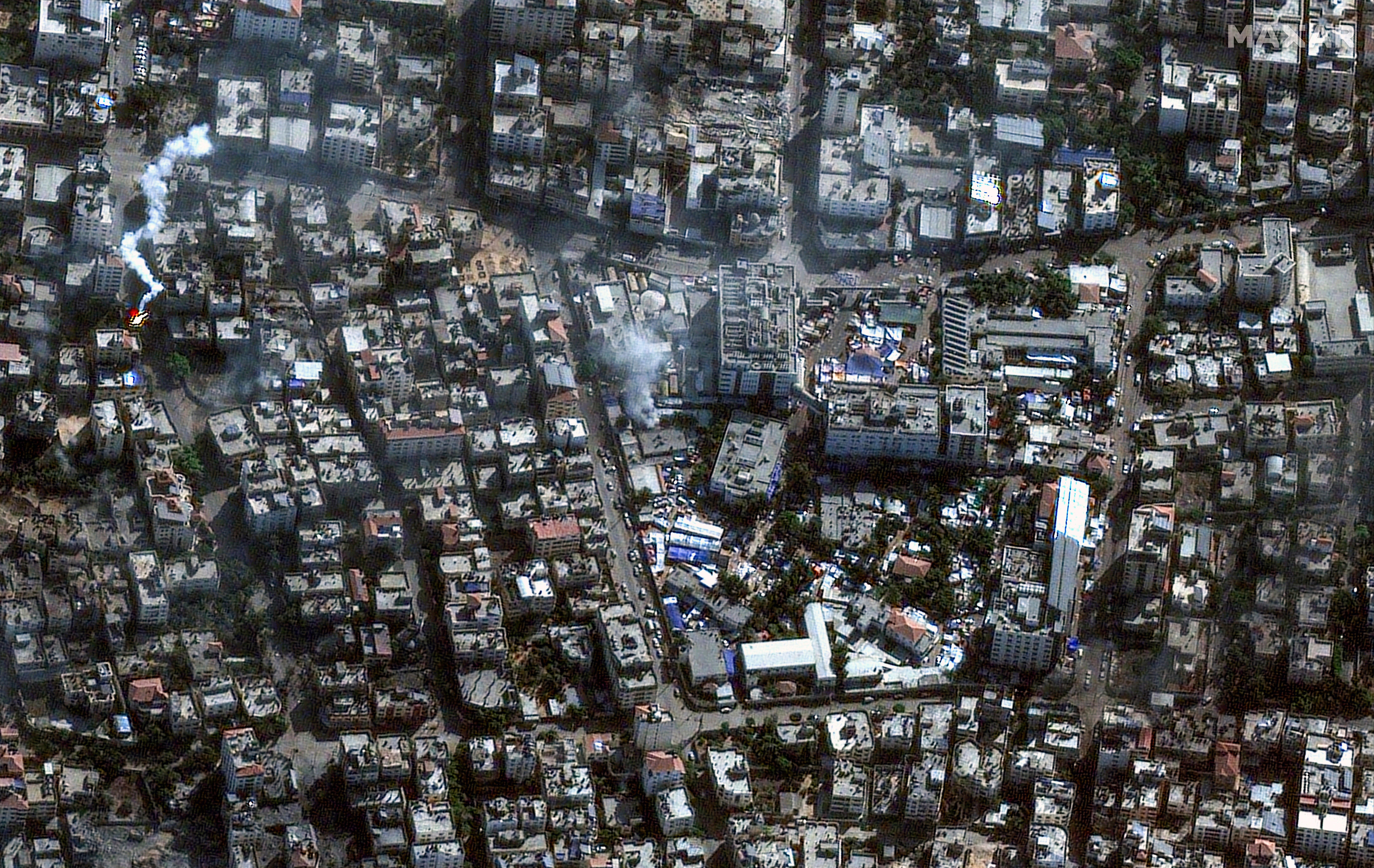Tin foil used to keep babies alive with incubators losing power at Gaza hospital – as tanks surround outside
Palestinian health officials say patients dying due to energy shortages as fighting between Israel and Hamas intensifies

Tiny babies, drowned by their nappies which are far too big, lie in rows in an ordinary hospital bed lined with aluminium foil. The rib cages of nearly all of the premature newborns stick out in lines through their skin. The foil is a makeshift solution to try to keep in warmth, to stop the babies – who weigh just a few pounds each and should be in incubators – dying of cold.
So far, three of 39 babies in al-Shifa Hospital, Gaza’s largest, have died as fuel has run out and the incubators have switched off, according to Palestinian medics. A total of 32 patients have died since al-Shifa’s emergency generator ran out of fuel on Saturday, according to the health ministry in Hamas-run Gaza.
The sprawling complex, which Israel accuses Hamas militants of using as a cover for an underground network of operations tunnels, is surrounded by Israeli tanks and troops who have reached the gates of the facility. Israel’s military says it is fighting Hamas in the area around the hospital, which lacks electricity, water, food, medicines and equipment. The health ministry claimed it was being hit by snipers and drone fire. A surgeon working for Medecins Sans Frontieres (MSF) inside al-Shifa recorded a message saying: “There’s also a sniper who attacked patients, they have gunshot wounds, we operated on three of them ... The situation is very bad, it is inhuman. It’s a closed area, no one knows about us.”

Dr Medhat Abbas, a director of al-Shifa and a top official in the health ministry in Gaza, said that four of the premature babies in the hospital have no mothers, as they were born through emergency caesarians while their injured mothers were dying.
“To sustain their lives they need the same temperature [as] the mother, this can only happen with incubators which keep the babies warm and which provide a special light to protect them from jaundice and artificial respiration if it’s needed,” Dr Abbas said.
“Now, because of the shortage of electricity, our doctors have gathered them in these ordinary beds and put aluminium foil around to keep them warm. It’s becoming colder here in Gaza; for that reason, without proper temperature control, some of them could die.
“Four of those babies lost their mothers. They were born through C-section as their mothers were dying. They have to make it through without their mothers and without electricity,” he added.

Fighting has been concentrated in the area around al-Shifa for days as Israel has intensified ground operations. It launched the military campaign on Hamas following an attack inside Israel that killed more than 1,200 people and saw around 240 hostages taken back into Gaza. The campaign has also involved near-continuous bombing of Gaza and a blockade. The health ministry in the Hamas-run Strip says more than 11, 000 people have been killed, including more than 4,600 children.
Dr Ahmed El Mokhallalati, a surgeon in al-Shifa who is looking after the babies, said the hospital is under “full blockade” and the premature babies that would normally be in individual incubators were being lined up eight to a bed, kept warm with whatever power was left.
“The tanks are in front of the hospital. We are under full blockade,” he told Reuters by telephone.
After three babies died, he added: “We are expecting to lose more of them day by day.” Prime minister Benjamin Netanyahu said on Sunday that Israel had offered fuel to al-Shifa but Hamas militants had refused to receive it. Israel military officials said troops left 300 litres of fuel to power emergency generators at the hospital entrance, but again said the offers were blocked by Hamas. Israel’s chief military spokesperson, Rear Admiral Daniel Hagari, later said the Israeli military would help evacuate babies from the hospital, at the request of the staff at al-Shifa.
The health ministry told The Independent that the Israeli authorities contacted al-Shifa’s hospital director and offered the hospital 300 litres of diesel and asked him to send somebody to go out to collect it. The hospital director refused the offer, fearing it would be too dangerous, and asked for fuel to be brought in via the Red Cross, which Israel refused. Israel has denied suggestions that staff would be attacked if they collected the fuel.

“Note that the rate of diesel consumption in al-Shifa Hospital is 500 litres per hour,” the statement added.
Asked about the fuel and evacuations, Gaza’s health ministry spokesperson Ashraf al-Qadra said they had not been informed about any mechanism to get the babies out to a safer hospital. “So far, we are praying for their safety and not to lose more of them,” he added.
Palestinian doctors told The Independent an estimated 650 patients left inside al-Shifa were trapped in a “circle of death” as military vehicles had advanced to the southeastern gate of the complex near where the maternity ward is located. Other medics – including those working with international medical charity MSF – have reported this week that evacuating had been impossible as people have been shot at when trying to leave. Some 500 staff are said to still be at the hospital.
Israel has repeatedly denied targeting the hospital – which thousands have fled in recent days – and insists Hamas is using it as a main operating base, which Hamas denies.
World Health Organisation (WHO) chief Tedros Adhanom Ghebreyesus also warned that al-Shifa “is not functioning as a hospital any more”. Patient fatalities had significantly increased, he said, with a “dire and perilous situation” at the hospital – left without electricity or water for three days – exacerbated by “constant gunfire and bombings in the area”.
A WHO spokesperson, Christian Lindmeier, later told the BBC: “Around the hospital, there are dead bodies which cannot be taken care of or not even be buried or taken away to any sort of morgue ... The hospital is not working at all any more as well as it should. It’s nearly a cemetery.”

Dr Mohamed Tabasha, head of the paediatric department at al-Shifa, said he feared he might lose more babies in the next few hours. Speaking to Reuters, he said they had been forced to move the babies to ordinary beds over the weekend.
“I never expected in my life that I would put 39 babies side by side on a bed, each with a different disease, and in this acute shortage of medical staff, of milk,” said Dr Tabasha.
“I cannot say how long they can last. I can lose another two babies today or in an hour.”
Dr Abbas told The Independent there were 100 bodies decomposing within al-Shifa that cannot be buried as it is too dangerous to do so. “Fifty are inside the hospital, and 60 are the morgues that aren’t working because of a lack of electricity,” Dr Abbas said.
Fighting also took place at a second major hospital in northern Gaza, al-Quds, which has also stopped functioning. The Palestinian Red Crescent said the hospital was surrounded by heavy gunfire, and a convoy sent to evacuate patients and staff had been unable to reach it.
Israel said it had killed “approximately 21 terrorists” at al-Quds in return fire after fighters shot from the hospital entrance. It released footage purporting to show a group of men at the hospital gate, one of whom appeared to be carrying a rocket-propelled grenade launcher.
The country added to its claims hospitals were being used by military by releasing footage on Monday night of weapons, it says, were discovered in the basement of Rantisi Hospital in Gaza, along with signs indicating hostages had been held there.
UN agencies observed a minute’s silence on Monday for 101 staff members killed so far in Gaza. The UN’s agency for Palestinian refugees, UNRWA, has said it is now housing around 800,000 people in Gaza, or half of those made homeless by the fighting.
UNRWA said on Monday that its emergency fuel depot for the enclave had finally run dry and it would soon – within 48 hours – be unable to run ambulances, resupply hospitals, provide drinking water or pump sewage.
Join our commenting forum
Join thought-provoking conversations, follow other Independent readers and see their replies
Comments
Bookmark popover
Removed from bookmarks